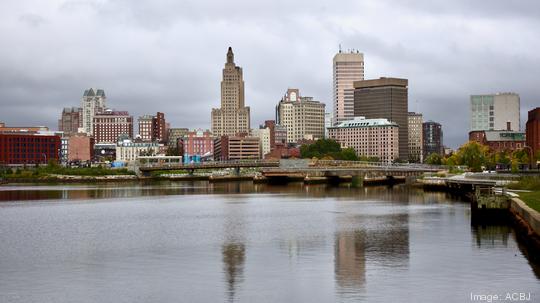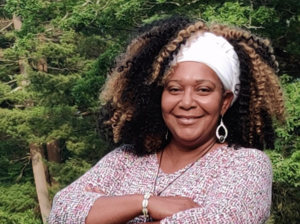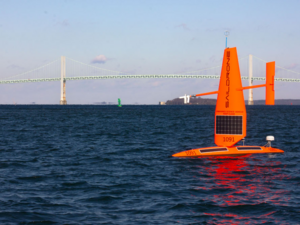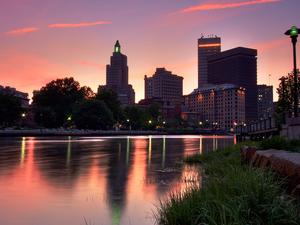
With a billion dollars at stake, Rhode Island residents are one step closer to what could be a revolutionary, new "blue economy" thanks to the Build Back Better Regional Challenge, a U.S. Economic Development Administration program designed to develop and scale regional industry along with training a new workforce.
A team from Rhode Island, including the University of Rhode Island Research Foundation and the state commerce department, were recently selected as one of 60 finalists and awarded $500,000 to further develop their proposed projects.
URI President Marc B. Parlange said Rhode Island was in a unique position to capitalize on the Build Back Better Challenge because of its established position courting blue economy sectors like off-shore wind farms and aquaculture.
“We’re happy to see URI play the role of an engine for the economy with this project and see it enable all kinds of people, create high paying jobs and create a sustainable economy,” he said. “This could be transformative to the point where the blue economy sector could double in size.”
Pete Rumsey, the chief business development officer of the URI Research Foundation and RI Blue Economy Tech Cluster "RI BETC" Lead, said the competition comes at a time when Rhode Island is ready and primed for a transformational investment.
“This is an opportunity to make generational change in a short period of time,” said Rumsey, who previously led the Rhode Island Innovation Campus Initiative, reporting to RI Commerce Secretary Stefan Pryor and then-Gov. Gina Raimondo. “This plan includes programs and projects to scale where we might do one every 10 years, but if we won we could do it all at once and that would have an incredible effect.”
Rumsey points to the Rhode Island Innovates report and its successor, produced in 2020, as the real starting point to the current competition. In Rhode Island Innovates 2.0, the authors stressed the importance of building infrastructure for the next century “around renewable energy, public transit and coastal resilience in general and specific cluster enhancing projects (e.g., Smart Bay and wet labs) in particular.” Rumsey said earlier planning enabled the state to make progress toward this goal.
According to the URI Research Foundation plan, grant money would be used to develop and attract innovation within the state's already growing blue economy while addressing historically excluded populations and proposing strategies to address economic disparities across the state. The proposed RI Blue Economy Technology Cluster (RI BETC) would also look to harness millions in state and private funds while collaborating with neighboring states to achieve the goal of five times the growth in gross regional product and up to six to eight times job growth in the sector over the state baseline. According to their proposal, if funded, the RI BETC could usher in an additional 54,000 blue-economy jobs and boost the GRP by 15% — $25 billion within 10 years.
The blue economy supports about $5 billion in sectoral output, with roughly 9% of RI’s total GRP, according to the URI report. This sector employs some 67,600 people, around 12% of the state's workforce. Because the majority of RI’s blue-economy jobs are supported by tourism, they register the lowest average employee productivity.
“We love tourism in Rhode Island,” Rumsey said. “But, by adding in new technology, new business, new innovation we can create an upswell of opportunity, new jobs and help the existing economy.”
Over the next 13 to 14 weeks, Rumsey said, the Rhode Island team will scale up their proposals, which include investment in the SmartBay Platform at Narragansett Bay, a blue tech innovation center, a blue economy workforce development pipeline, Ocean-based renewables infrastructure and investment in critical aquaculture, fisheries, and seafood technology.
The Smart Bay, Rumsey said, could "democratize access to cutting-edge data and equipment capability”, which is currently only reserved for the largest industry and governmental organizations.
“We want to take some of the incredible work happening there and open it up to startups, small businesses, non-profits, government, and academic institutions,” he said. “We also want to work with existing assets we have like NOAA and the Naval Underwater Center, the Air National Guard and others.”
Rumsey envisions the Smart Bay as a test bed and playground where people can test their ideas from the ground up. He sees the proposed Blue Tech Innovation Center (BTIC) in a similar fashion, a place for leading Blue Technology accelerators, venture capital, startup ventures, research faculty, ocean and coastal resilience experts, and innovative nonprofits to gather and workshop ideas.
“Overall though, our plan is focused on workforce development and equity,” he said. “We want to introduce new high payer jobs and ownership of some of these new blue-economy jobs for people who have been traditionally left out,” he said.
For Parlange and URI, the promise of an off-shore wind center serving the East Coast is one of many highlights he hopes to see.
“I see it as a center for off-shore wind, not only to farm but to study, offer training and incorporate learning as well,” Parlange said. “The other is aquaculture. We’ve already established growth here but we need investment to develop resiliency. A small example would be oyster seeds. We should strive to have enough to serve all of Rhode Island’s 84 farms so we don’t need to purchase out of state.”
The workforce development pipeline would include training centers across Rhode Island, a center for offshore wind workforce training and advanced certification in building trades, hiring commitments by industry partners, and "earn and learn" programs" which enables participants to get long-term training so they can move up in the blue economy.
“As we head into the new year, we’ll be looking at refining our projects and pressure testing them,” Rumsey said. The Research Foundation will be eligible to apply for phase two funding in March 2022 for a shot at $1 billion.








